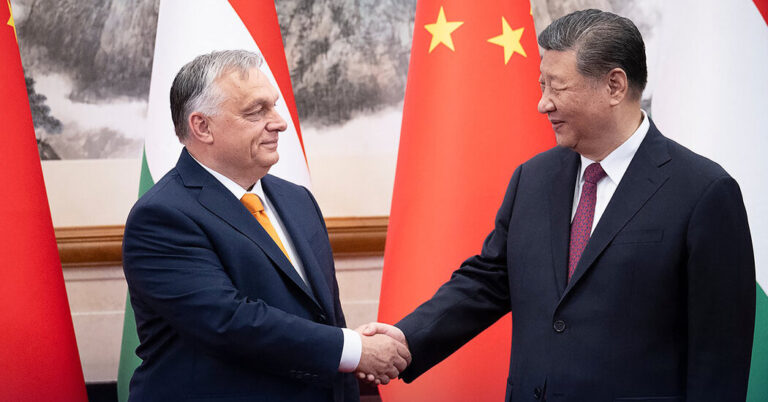Hungarian Prime Minister Viktor Orban met with Chinese leader Xi Jinping in Beijing on Monday, courting another authoritarian partner after talks with Russian President Vladimir V. Putin. in Moscow last week.
In announcing Mr Orban’s visit to Beijing, China’s official news agency Xinhua just said that Mr Xi would hold an “in-depth discussion on issues of mutual concern” with him. The leaders last met two months ago, when Mr Xi visited Budapest as part of an initiative to restore Chinese influence in Europe.
Chinese state television said Mr Xi and Mr Orban were holding talks at the Diaoyutai state guesthouse, but gave no further details.
The meeting will give Mr. Xi and Mr. Orban, who has been an outlier in the European Union in his support for Ukraine and other issues, a chance to push the bloc to distance itself from Washington. Hungary began its six-month rotating presidency of the Council of the European Union this month, giving Mr. Orban greater visibility, but not much more influence, in broader European affairs.
“Our two countries, China and Hungary, have similar philosophies and both value independence and acting on one’s own initiative,” Xi told Orban in May, according to a press release. Chinese official summary of their interviews.
Western European leaders have long distanced themselves from Mr. Orban, and during his visit to Moscow last week, they stressed that he was not speaking for the European Union. They are also likely to take a skeptical view of the talks between Mr. Orban and Mr. Xi in Beijing, during which the two leaders are expected to discuss the war in Ukraine.
Mr Orban’s visit to China comes ahead of a three-day NATO summit in Washington that begins on Tuesday. At those talks, President Biden and other Western leaders are expected to likely to offer Ukraine more support in its war against Russian invasion, but not the NATO membership that its president, Volodymyr Zelensky, has demanded.
Mr. Orban describes his trip to Beijing Hungary is continuing its “peace” mission in Ukraine, a term Hungary uses to describe an agreement based on Ukrainian capitulation to Russian demands. Putin’s visit to Russia last week was the first by a European Union leader to hold formal talks with him since the early months of Russia’s invasion of Ukraine.
Before heading to Moscow, Mr Orban met with Mr Zelensky in kyiv, in what observers saw as an attempt by the Hungarian leader to end its isolation in Europe because of UkraineHis visits to Ukraine, Russia and China were not announced in advance.
Mr Orban has made numerous calls for Moscow and kyiv to accept a ceasefire and direct talks, but he has not made any specific public proposals for a lasting settlement.
Similarly, Mr. Xi has promoted a vague framework for peace talks between Ukraine and Russia, while remaining cautious about maintaining strong ties with Mr. Putin. Chinese troops will take part in military exercises in Belarus, a neighbor and close partner of Russia, in mid-July, China’s Ministry of National Defense said. announced on On Sunday, the ministry said the joint exercises would focus on “counter-terrorism” operations and hostage rescue.
The talks between Mr Orban and Mr Xi will provide another opportunity for them to underscore their shared antipathy toward Western security alliances and human rights criticism.
Mr Orban, once a critic of China’s ruling Communist Party, has emerged as a strong partner. He often clashes with the European Union’s criticism of China’s hardline policies in Hong Kong, Tibet and Xinjiang, the western region where Uighurs and other mostly Muslim ethnic groups face mass detentions.
In May, Mr Xi and Mr Orban officially raised Sino-Hungarian relations are an “all-weather comprehensive strategic partnership” — Chinese diplomatic terminology that suggests a deep and enduring bond.
“We consider each other as a priority partner for cooperation,” Mr. Xi wrote at the time relations with Hungary.


